
Cotton Mather was a Puritan clergyman and author in colonial New England, who wrote extensively on theological, historical, and scientific subjects. After being educated at Harvard College, he joined his father Increase as minister of the Congregationalist Old North Meeting House in Boston, Massachusetts, where he preached for the rest of his life. He has been referred to as the "first American Evangelical".

Roger Williams was an English-born New England Puritan minister, theologian, and author who founded Providence Plantations, which became the Colony of Rhode Island and Providence Plantations and later the State of Rhode Island. He was a staunch advocate for religious freedom, separation of church and state, and fair dealings with the Native Americans.
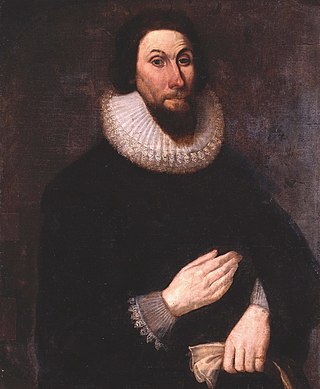
John Winthrop was an English Puritan lawyer and one of the leading figures in founding the Massachusetts Bay Colony, the second major settlement in New England following Plymouth Colony. Winthrop led the first large wave of colonists from England in 1630 and served as governor for 12 of the colony's first 20 years. His writings and vision of the colony as a Puritan "city upon a hill" dominated New England colonial development, influencing the governments and religions of neighboring colonies in addition to those of Massachusetts.

The Salem witch trials were a series of hearings and prosecutions of people accused of witchcraft in colonial Massachusetts between February 1692 and May 1693. More than 200 people were accused. Thirty people were found guilty, nineteen of whom were executed by hanging. One other man, Giles Corey, died under torture after refusing to enter a plea, and at least five people died in jail.

This American Life (TAL) is an American weekly hour-long radio program produced in collaboration with Chicago Public Media and hosted by Ira Glass. It is broadcast on numerous public radio stations in the United States and internationally, and is also available as a free weekly podcast. Primarily a journalistic non-fiction program, it has also featured essays, memoirs, field recordings, short fiction, and found footage. The first episode aired on November 17, 1995, under the show's original title, Your Radio Playhouse. The series was distributed by Public Radio International until June 2014, when the program became self-distributed with Public Radio Exchange delivering new episodes to public radio stations.

Anne Hutchinson was a Puritan spiritual advisor, religious reformer, and an important participant in the Antinomian Controversy which shook the infant Massachusetts Bay Colony from 1636 to 1638. Her strong religious convictions were at odds with the established Puritan clergy in the Boston area and her popularity and charisma helped create a theological schism that threatened the Puritan religious community in New England. She was eventually tried and convicted, then banished from the colony with many of her supporters.

Thomas Dudley was a New England colonial magistrate who served several terms as governor of the Massachusetts Bay Colony. Dudley was the chief founder of Newtowne, later Cambridge, Massachusetts, and built the town's first home. He provided land and funds to establish the Roxbury Latin School and signed Harvard College's new charter during his 1650 term as governor. Dudley was a devout Puritan who opposed religious views not conforming with his. In this, he was more rigid than other early Massachusetts leaders like John Winthrop, but less confrontational than John Endecott.

John Cotton was a clergyman in England and the American colonies, and was considered the preeminent minister and theologian of the Massachusetts Bay Colony. He studied for five years at Trinity College, Cambridge, and nine years at Emmanuel College, Cambridge. He had already built a reputation as a scholar and outstanding preacher when he accepted the position of minister at St. Botolph's Church, Boston, in Lincolnshire, in 1612.
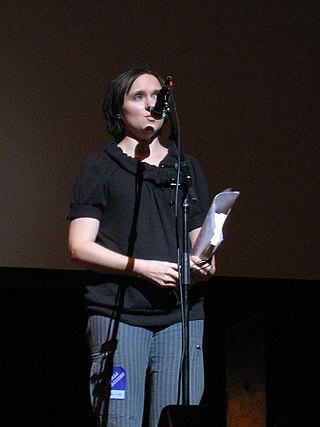
Sarah Jane Vowell is an American historian, author, journalist, essayist, social commentator and actress. She has written seven nonfiction books on American history and culture. She was a contributing editor for the radio program This American Life on Public Radio International from 1996 to 2008, where she produced numerous commentaries and documentaries and toured the country in many of the program's live shows. She was also the voice of Violet Parr in the 2004 animated film The Incredibles and its 2018 sequel.

Mary Dyer was an English and colonial American Puritan-turned-Quaker who was hanged in Boston, Massachusetts Bay Colony, for repeatedly defying a Puritan law banning Quakers from the colony. She is one of the four executed Quakers known as the Boston martyrs.
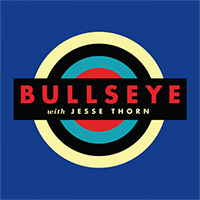
Bullseye with Jesse Thorn is a public radio program and podcast based in Los Angeles, California, and distributed by National Public Radio (NPR). The weekly show is currently heard on over 150 public radio stations. The program features host Jesse Thorn interviewing personalities in arts and culture, with a special focus on comedy.

John Wheelwright was a Puritan clergyman in England and America, noted for being banished from the Massachusetts Bay Colony during the Antinomian Controversy, and for subsequently establishing the town of Exeter, New Hampshire. Born in Lincolnshire, England, he graduated from Sidney Sussex College, Cambridge. Ordained in 1619, he became the vicar of Bilsby, Lincolnshire, until he was removed for simony.

The Puritan migration to New England was marked in its effects from 1620 to 1640, declining sharply afterwards. The term Great Migration can refer to the migration in the period of English Puritans to the New England Colonies, starting with Plymouth Colony and Massachusetts Bay Colony. They came in family groups rather than as isolated individuals and were mainly motivated by freedom to practice their beliefs.
Thomas Brattle was an American merchant who served as treasurer of Harvard College and member of the Royal Society. He is known for his involvement in the Salem Witch Trials and the formation of the Brattle Street Church.
Stephen Egerton (1555?-1621?) was an English priest, a leading Puritan preacher of his time, who was also active in agitating for reform of the Church of England.

In the early 17th century, thousands of English Puritans settled in North America, almost all in New England. Puritans were intensely devout members of the Church of England who believed that the Church of England was insufficiently reformed, retaining too much of its Roman Catholic doctrinal roots, and who therefore opposed royal ecclesiastical policy. Most Puritans were "non-separating Puritans" who believed there should be an established church and did not advocate setting up separate congregations distinct from the Church of England; these were later called Nonconformists. A small minority of Puritans were "separating Puritans" who advocated setting up congregations outside the Church. The Pilgrims were a Separatist group, and they established the Plymouth Colony in 1620. Puritans went chiefly to New England, but small numbers went to other English colonies up and down the Atlantic.
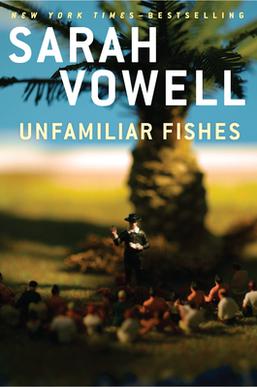
Unfamiliar Fishes is a nonfiction book by This American Life contributor Sarah Vowell, first published in 2011 in print and audiobook versions.
Margaret Tyndal Winthrop was a 17th-century Puritan, the wife of John Winthrop, the first governor of the Massachusetts Bay Colony. The pair are notable for the survival and character of the love letters which they wrote to each other.
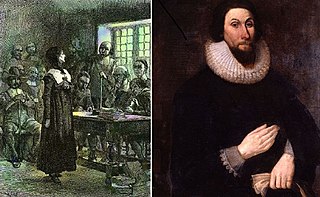
The Antinomian Controversy, also known as the Free Grace Controversy, was a religious and political conflict in the Massachusetts Bay Colony from 1636 to 1638. It pitted most of the colony's ministers and magistrates against some adherents of Puritan minister John Cotton. The most notable Free Grace advocates, often called "Antinomians", were Anne Hutchinson, her brother-in-law Reverend John Wheelwright, and Massachusetts Bay Governor Henry Vane. The controversy was a theological debate concerning the "covenant of grace" and "covenant of works".

John Wilson was a Puritan clergyman in Boston in the Massachusetts Bay Colony, and the minister of the First Church of Boston from its beginnings in Charlestown in 1630 until his death in 1667. He is most noted for being a minister at odds with Anne Hutchinson during the Antinomian Controversy from 1636 to 1638, and for being an attending minister during the execution of Mary Dyer in 1660.
















